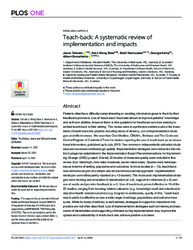Please use this identifier to cite or link to this item:
http://hdl.handle.net/11054/1573| Title: | Teach-back: A systematic review of implementation and impacts. |
| Author: | Talevski, J. Wong Shee, Anna Rasmussen, B. Kemp, Georgie Beauchamp, A. |
| Issue Date: | 2020 |
| Publication Title: | PLoS ONE |
| Volume: | 15 |
| Issue: | 4 |
| Start Page: | e0231350 |
| Abstract: | Patients often have difficulty comprehending or recalling information given to them by their healthcare providers. Use of ‘teach-back’ has been shown to improve patients’ knowledge and self-care abilities, however there is little guidance for healthcare services seeking to embed teach-back in their setting. This review aims to synthesize evidence about the translation of teach-back into practice including mode of delivery, use of implementation strategies and effectiveness. We searched Ovid Medline, CINAHL, Embase and The Cochrane Central Register of Controlled Trials for studies reporting the use of teach-back as an educational intervention, published up to July 2019. Two reviewers independently extracted study data and assessed methodologic quality. Implementation strategies were extracted into distinct categories established in the Implementation Expert Recommendations for Implementing Change (ERIC) project. Overall, 20 studies of moderate quality were included in this review (four rated high, nine rated moderate, seven rated weak). Studies were heterogeneous in terms of setting, population and outcomes. In most studies (n = 15), teach-back was delivered as part of a simple and structured educational approach. Implementation strategies were infrequently reported (n = 10 studies). The most used implementation strategies were training and education of stakeholders (n = 8), support for clinicians (n = 6) and use of audits and provider feedback (n = 4). Use of teach-back proved effective in 19 of the 20 studies, ranging from learning-related outcomes (e.g. knowledge recall and retention) to objective health-related outcomes (e.g. hospital re-admissions, quality of life). Teach-back was found to be effective across a wide range of settings, populations and outcome measures. While its mode of delivery is well-defined, strategies to support its translation into practice are not often described. Use of implementation strategies such as training and education of stakeholders and supporting clinicians during implementation may improve the uptake and sustainability of teach-back and achieve positive outcomes. |
| URI: | http://hdl.handle.net/11054/1573 |
| DOI: | https://doi.org/10.1371/journal.pone.0231350 |
| Internal ID Number: | 01514 |
| Health Subject: | TEACH-BACK SYSTEMATIC REVIEW CONSUMER INFORMATION PATIENT UNDERSTANDING EDUCATIONAL INTERVENTION |
| Type: | Journal Article Article |
| Appears in Collections: | Research Output |
Files in This Item:
| File | Description | Size | Format | |
|---|---|---|---|---|
| PLOS ONE.pdf | Allowed to upload from PLoS ONE website | 1.2 MB | Adobe PDF |  View/Open |
Items in DSpace are protected by copyright, with all rights reserved, unless otherwise indicated.
